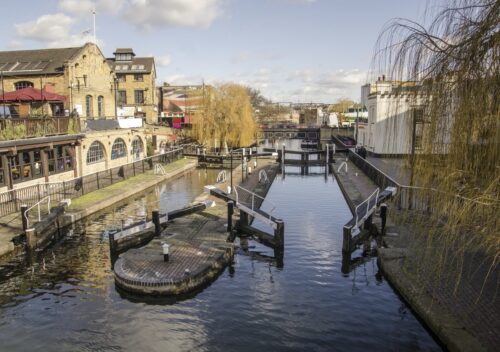
By Francesco Bianchini
Until I was twenty-five, life at my family home seemed stuck on a tortuous hill, with a big truck lumbering in front. I saw only the back of that truck, with no way to pass. Not surprisingly, I fled Umbria at the first opportunity. I was no longer a teenager looking for adventure; I was well out of college, my peers already had careers, and were thinking about making serious money, and starting families. I left for London a few days after the fall of the Berlin Wall, with only a one-way ticket and a bit of cash from a short stint working in a travel agency in Rome.
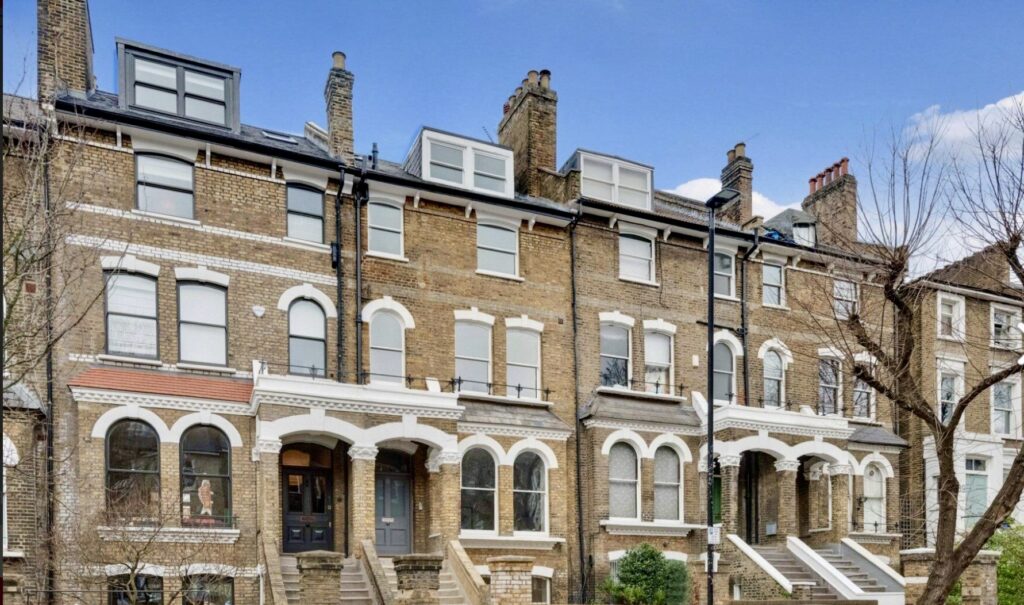
St Augustine’s Road, NW1 London
I managed to find a shared flat, the top two floors of a red brick Victorian building, in Camden Town – at that time certainly not the fashionable neighborhood it is today. I had to adapt to being in company with a psychoanalyst who also used the place as his professional studio. Despite the man’s assumption of primus inter pares, I began to tame the space where – by his imperative instruction – my presence was absolutely never to be detected by his patients. So, during his consulting hours, I’d lock myself in the kitchen, trying to ignore whatever dirty dishes he’d left soaking from the night before, and on which were usually floating films of fried egg, bedraggled watercress, and other unsightly refuse. I would tentatively sauté an onion on the stove, but had to be careful not to allow the smell to waft through the house and arrive – God forbid! – at the psychiatry couch from which I could faintly hear the man’s patients reciting their plaintive rosaries.
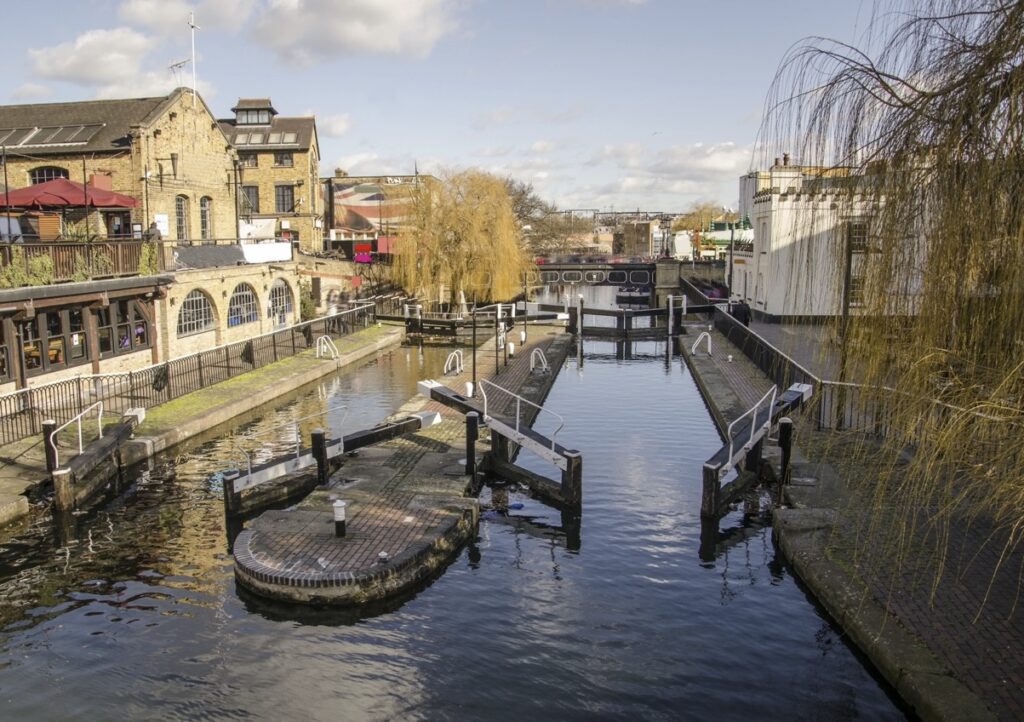
Camden Lock
One evening near the start of our tormented acquaintance, I announced I would cook for the both of us. I believe the man had actually recognized my aptitude for cooking – with the implication, however, that typical Italian dishes required good ventilation. I discreetly chopped chicken livers and, before adding them to the frying pan, raised the window over the sink. Despite this precaution, however, and with a great commotion, the doctor slammed open the kitchen door, poked his head in, eyes huge behind his thick round lenses. He stared agape in the direction of the rising fumes. That stylized and stunned expression reminded me of those wide-eyed Sumerian alabaster idols populating display cases in the British Museum. Yet the preparation of that liver ragout was the genesis of what allowed me to feel at home in London; it gave me the courage to experiment, to go find a job, to try to live my adventure to the fullest.
I started by washing dishes in a vegetarian restaurant. The place – located on Carnaby Street – was popular when, in Princess Diana’s Britain, feasting on carrot and orange soup, and eating banana bread was the trend. It was called Cranks, and – aping the interior of a French boulangerie – was minimalist in style; walls of exposed brick, wooden tables with coverings of recycled paper, a menu du jour posted on a large blackboard. As soon as it opened, the smell of toasted wholemeal breads and freshly-ground and brewed coffee wafted up and down the road, attracting an early-morning clientele. There, serenaded by Mozart and with baked treats, fresh from the oven, each customer could spend a quiet moment before facing the day – with the naive belief that the world was still in good order.
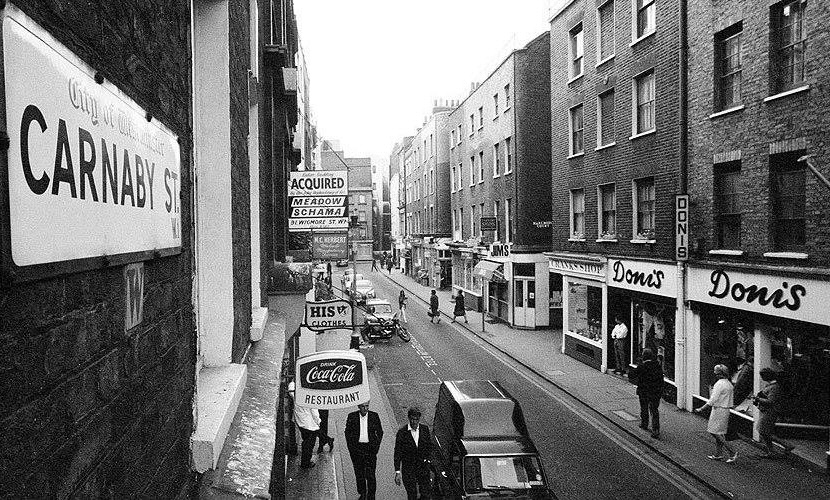
Carnaby Street, Crank’s next to Donis
Cranks’ kitchen was dominated by the hum of ventilated ovens, the clicking of knives on cutting boards, and the chatter of the staff. My colleagues were mostly aspiring musicians, artists, and actors, and – especially at the beginning of the week, when the weekend was only a mirage – everyone exchanged experiences, hopes, and frustrations. As dishes came steaming out of the dishwasher, Marta separated knives from forks and spoons, and dried them while perched on a stool, searching – despite the confusion – for someone with whom to talk. Vicky was usually nearby, chopping mounds of parsley at the next table, and although the two were attending the same fine arts school – one studying graphic design and the other sculpture – there was far from good blood between them. From my station at the sink, I could overhear their rivalries over men.
As lunchtime approached, the restaurant always filled up, and the buffet line stretched out into the street. Waiters had to hurriedly clear tables and place the trays directly on the kitchen floor, laden with dirty dishes and sloppy leftovers. When I couldn’t keep up with the pace of washing, and things couldn’t get much worse, I’d slip out the backdoor, through the refrigerated room, with a plate of freshly baked raisin bread and an indecent scoop of thick, greasy whipped cream. The staff latrine had been spared the restaurant’s sound system, and was the only place to make yourself inconspicuous for ten minutes. They’d freshly repainted the stalls, but on the wall in front of one toilet someone had written in block letters: NO MORE GRAFFITI, YOU HEAR?! Further down was the scrawled retort: ‘Life is unspeakably beautiful at times like these…’
The London that I lived in for nine months was a big, generous city. If you could manage your finances wisely, you could do a lot of things without feeling like a pauper. The museums were almost all free and offered cultural activities; the beautiful baroque churches had concerts at reduced prices, the parks were accessible to all, and you could travel by bus and tube with a very cheap card. I’m not saying that money doesn’t make a difference, but I am convinced that sometimes having little of it translates into a state of mental destitution; a form of resignation that risks blocking the imagination. Yet it cost nothing to get lost in the visions of the Impressionists on display at the Courtauld, or to find the Italian landscapes painted by Turner at the Tate. Everyone was allowed to walk the rain-slicked paths of Highgate Cemetery, or to stoop in Kew Gardens to read the exotic names written on steel tags; to doze off after tea in the tropical warmth of the Palm House, or stop in front of the windows of antique dealers in King’s Road, fantasizing about what your own home would be like – some day soon. The best things in London were within everyone’s reach.
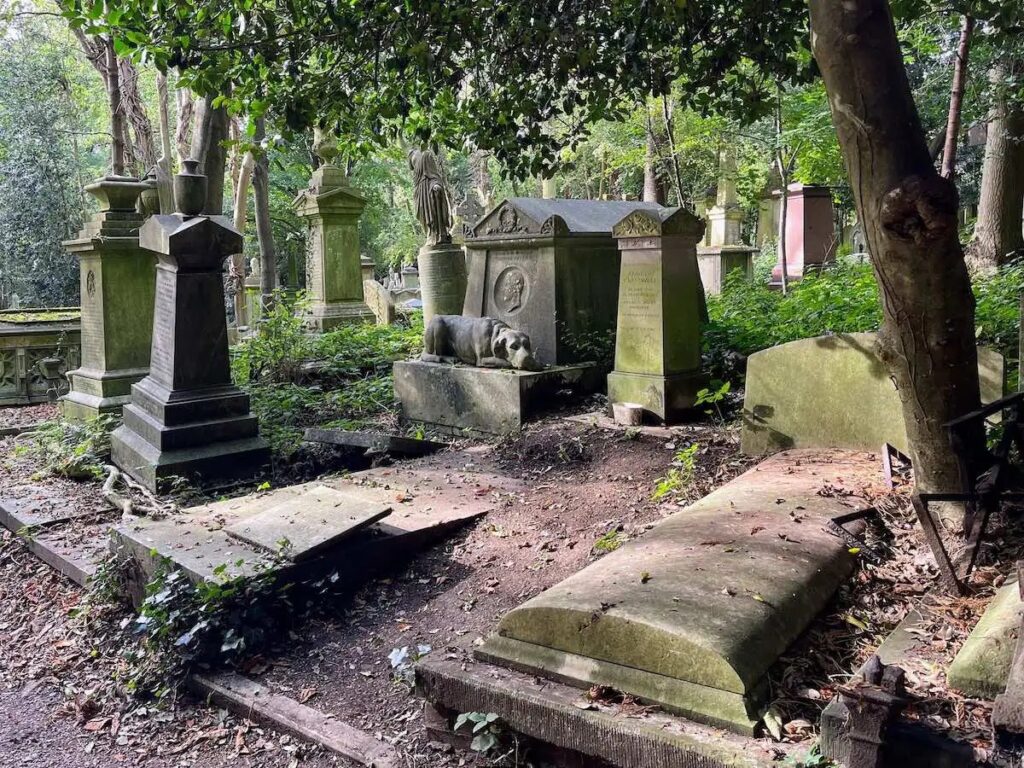
My friends at Highgate (courtesy of https://
On my days off I’d walk the length and breadth of the city, and everything I saw, touched, and felt made me hungry. The fallen leaves of plane trees formed dirty and slimy mats in the street drains, and those first gray and liquid days now bring to mind new flavors, those tasting of English autumns, of mushrooms and starchy foods. (And, curiously, that of sake, which I first drank lukewarm, and with immoderation and naivety, when my roommate’s Korean friends came to dinner.) When I think of food – sustenance that smacks of narrowness and abstruse calculations not to trespass on a meagre budget – my memory goes back to the sausage rolls they served in a Piccadilly diner. It was a pretentious and at the same time cheesy place; all mirrors, brass, and long counters laden with ready-made dishes for the midday office crowd. A sausage roll is a ‘banger’ wrapped in puff pastry and glazed with egg or milk before being cooked. The sausage is still hot inside and the puff pastry in contact with the peppery, savory meat deliciously soaked in its juices. The roll and a cup of smoked Chinese tea radiated the warmth and nourishment I needed on the days I walked endlessly, without feeling the miles, in the damp foggy cold of those long-gone months.




